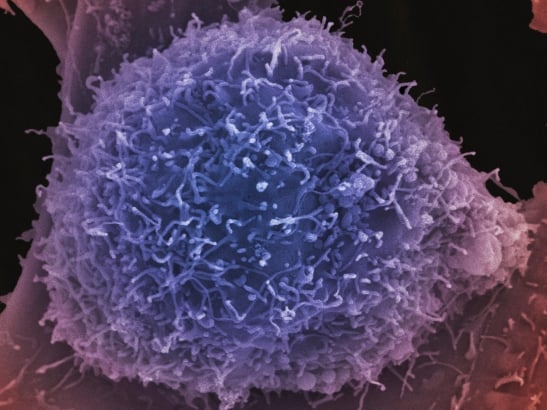
Image: Prostate cancer cell. Anne Weston, Francis Crick Institute.
A new radioactive medicine that seeks out tumour cells to deliver a targeted dose of radiation greatly improves quality of life for patients with advanced prostate cancer, a phase III study finds.
Patients with advanced prostate cancer who were treated with the ‘search and destroy’ drug, called Lu-PSMA (177Lu-PSMA-617), alongside standard care, experienced a higher quality of life when than those treated with standard care alone.
Earlier analyses from the same trial showed that Lu-PSMA improves survival. Experts are now calling for the new evidence to be considered by NICE as it assesses whether the treatment should be made available on the NHS.
The researchers, led by The Institute of Cancer Research, London, The Royal Marsden NHS Foundation Trust, and the Gustave Roussy, France, also found that patients treated with the drug lived for longer before their pain levels increased. Metastatic prostate cancer spreads to the bone in around nine in 10 patients and can cause severe pain.
The research, published in The Lancet Oncology, is part of the VISION trial which is led by an international group including researchers at The Institute of Cancer Research (ICR) and The Royal Marsden, and the Memorial Sloan Kettering Cancer Center in the US.
It was supported by Advanced Accelerator Applications, a Novartis Company.
Seeks out cancer cells
Prostate-specific membrane antigen, or PSMA, is a protein present at higher levels on the surface of cancer cells in some prostate cancer patients. Lu-PSMA seeks out cancer cells with high levels of PSMA, binds to them and delivers a precise dose of radiation to destroy the cancer.
The study looked at 617 patients who had PSMA-positive advanced prostate cancer and had already received at least one targeted hormone treatment – such as enzalutamide or abiraterone – alongside chemotherapy.
The patients were asked to fill in three questionnaires which established scores for their quality of life the severity of pain and the impact of pain on daily functions and their current state of health across several areas of life.
Live well for longer
It took longer for patients’ quality of life to worsen in the treatment group – 9.7months for the Lu-PSMA group compared with just 2.4 months for patients receiving standard care.
For pain severity and impact of pain on daily functions, it took 14.3 months for symptoms to worsen in the Lu-PSMA group compared with 2.9 months for patients in the standard care group.
Measures for general state of health took 0.9 months to worsen for patients receiving Lu-PSMA compared with 0.4 months for patients receiving standard care.
Researchers believe that these additional findings from the VISION trial strengthen the argument for making Lu-PSMA available on the NHS for patients with advanced prostate cancer who have received previous treatment with at least one targeted hormone treatment and chemotherapy.
NICE announced a draft decision to not recommend Lu-PSMA for use on the NHS in February 2023, and a final decision is expected in October this year.
Cutting-edge medicine
Professor Johann De Bono, Professor of Experimental Cancer Medicine at The Institute of Cancer Research, London, and Consultant Medical Oncologist at The Royal Marsden NHS Foundation Trust, co-led the VISION trial said:
“For men with advanced prostate cancer, bone is the most common site of spread and this can lead to some of the most painful and debilitating complications of the disease. Finding new treatments that not only improve survival, but also reduce pain and improve quality of life is extremely important.”
“PSMA is a cutting-edge, search-and-destroy medicine that not only extends patients’ lives, but also grants them precious extra months of living well, even with advanced cancer. It’s fantastic to see the impact this precision medicine is having on patients’ lives and I hope it will be made available for eligible patients on the NHS.”
